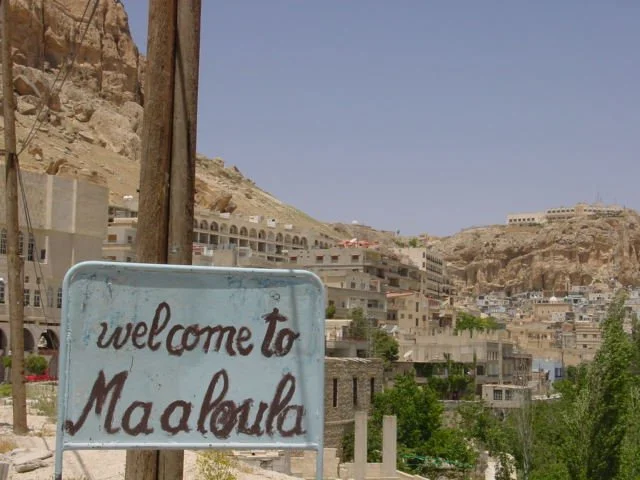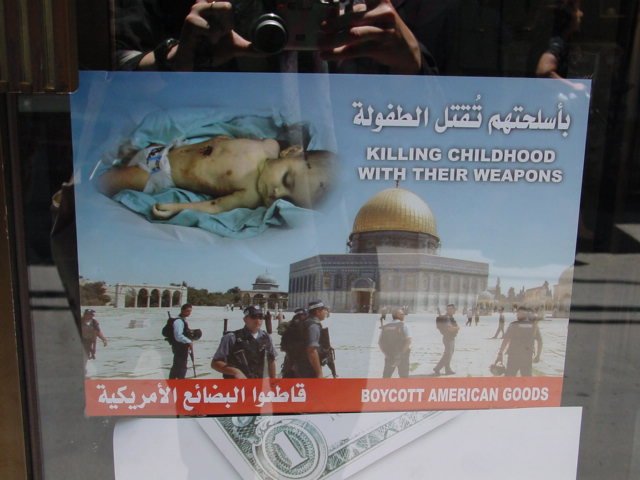May 30, 2002
Elizabeth at the Bagdad Cafe.
Farewell, Palmyra. We headed on our way to Damascus, a place we'll be staying for a few nights. That'll be most welcome. Along the way, we stopped for a rest break at the Bagdad Cafe where we could also buy t-shirts. Since five of us on the trip went to Iraq together last May, it was a must-see.
Ma’aloula.
Icon of St. Thekla.
We stopped for lunch in the beautiful Christian village of Ma'aloula, one of several villages in the area where a dialect of Aramaic is still spoken. It is not exactly the same as the ancient language spoken by Jesus, but rather a modern version of it. It is communities like this which are a welcome resistance against the monolithic global and regional cultures. We also visited the beautiful little shrine and monastery dedicated to St. Thekla. Known from the apocryphal Acts of Paul and Thekla, Thekla was a disciple of Paul's who was threatened with death because of her faith. However, tradition holds that the earth swallowed her up to save her from that fate, and a steep canyon marks the site of the miracle. As our Melkite companion explained, books such as Acts of Paul and Thekla are not canonical (that is, not part of the Bible), but the stories contained in them that the church considers worthy of passing along, become part of the Christian Tradition. Thekla is one such instance, and he shared with us the prayer of St. Thekla from the Melkite prayer book.
Syrian Orthodox Patriarch Ignatius Zakka I.
We then went to visit the Syrian Orthodox Patriarch at the Monastery of St. Ephraim. He spends his time between the Monastery and the Patriarchate in Damascus under the title "Syrian Orthodox Patriarch of Antioch and all the East." Not bad. The name "Syrian Orthodox" has created some confusion, leading some to believe it is a national church related to Syria. In Arabic, there is a clear distinction between the two words translated as "Syrian", so some have begun calling the church "Syriac Orthodox" to distinguish. The seminary itself is quite new and is an important center for theological training in this ancient church. Again, we were privileged to hear the Lord's Prayer in Aramaic.
The ubiquitous call to boycott American products.
An ecumenical gathering of Syrian clergy.
We arrived in Damascus, where we were greeted with signs announcing a boycott on US goods in response to American Middle East policy. Now we know why we've had a hard time finding Coca-Cola in Syria. About half of our group felt rested enough to attending an ecumenical meeting hosted by the Middle East Council of Churches, our wonderful guides throughout our stay here. Clergy and laity alike attended from the various denominations, and the topics ranged far and wide.
The question of proselytism seemed foremost on the minds of the local clergy, particularly the Orthodox. It seems that from time to time missionaries come to the Middle East seeking to share the gospel among Muslims, but find themselves unable to translate their message to them - thus, they end up sharing their version of the gospel with Christians (some call it "sheep-stealing"). Some shared privately that such folks could present a healthy challenge to the ancient churches, but there was also great concern about their dismissal of the ancient churches as not real Christians. Also, many were troubled by outsiders coming in to change Muslim hearts, failing, and leaving the local church to clean up the mess and bear the brunt of resentment. It's clearly a problem that must be addressed.
An icon of Saints Peter and Paul reminds us of the desire for Christian unity.
The ecumenical spirit is impressive. We are talking about how to round out our time here in Lebanon and Syria with something liturgical. We talked about communion, but the diversity of practices, theologies, and hierarchies means little chance we will be able to find common ground. Such is the struggle for Church unity.







